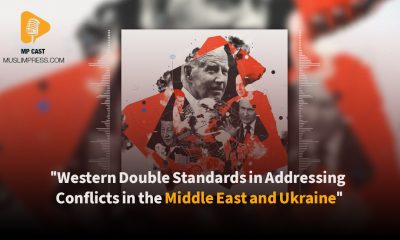World news
Palestinian-Israeli conflict the focal point of contention between the Western world and the Islamic world

The intellectual and theoretical foundation for the establishment of the Zionist regime is primarily based on ancient Jewish texts and sources, especially Torah and Talmudic legends, as articulated by Zionist theorists and thinkers (both Jewish and non-Jewish) and particularly Zionist leaders and intellectuals in the past and present. However, it should be noted that Zionist theorists and leaders have expressed their interpretations and political and intellectual objectives on this matter. The common thread among all these perspectives is the theory of the necessity of Jewish settlement and establishment of a Jewish state in a specific land, primarily referred to as the “Promised Land of the Jewish People.” This Promised Land is, in fact, Palestine. The Zionist hypothesis of “Jewish return” has been formulated and reiterated in various forms and dimensions by some prominent Jewish leaders and figures throughout history. Based on this premise, European Jews in 1882 gathered in Russia to address their dispersion and homelessness. They formed organizations under the banner of the Jewish Agency, as suggested by Herzl, to coordinate the negotiations and plans of the Zionists and to establish a Jewish homeland. The first Zionist Congress was convened in the city of Basel, and after consultations and extensive negotiations, resolutions were issued. In these resolutions, the Zionist movement’s program was outlined, and Palestine was designated as the region for Jewish migration and the establishment of a united Jewish nation. They referred to Palestine as the Land of Israel, and the Zionist flag and national motto were determined.
On November 29, 1947, the United Nations General Assembly, influenced by the penetration and propaganda of the Jewish Agency, issued contentious resolutions known as the partition of Palestine into two independent states: an Arab state and a Jewish state. The Jewish Agency fulfilled its historical aspiration of establishing the state of Israel. However, this marked the beginning of other conflicts, leaving lasting geopolitical repercussions in the West of Asia.
The intellectual and political foundation of Zionism has always been supported and accompanied by Western governments, especially Britain and later the United States. The establishment and continuity of the state of Israel in recent decades would not have been possible without extensive support from the Western world. However, they have also pursued their interests in this support and aimed to capitalize on the opportunities presented to them to achieve their goals. The occupation of Palestinian land, historically and from a human, identity, and international law perspective, was accomplished with tolerance and assistance from the powers of that time, resulting in the displacement of the inhabitants of historical Palestine.
After more than six decades of the existence of the Israeli regime, the Palestinian-Israeli conflict remains the most fundamental international dispute, the focal point of contention between the Western world and the Islamic world. Despite repeated violations of Palestinian rights, Zionist theorists and Israeli authorities and their supporters have come to realize that the policy of suppression and the maintenance of occupied lands cannot ensure Israel’s security. Meanwhile, the security and psychological environment of the West of Asia continues to be influenced by the existence of this regime. Recent decades have witnessed a series of intellectual, social, and demographic changes within certain segments of Israeli society, with echoes of these developments manifesting in the political arena. In the contemporary context, critical and revisionist ideas regarding Zionist practices have been on the rise, and protests against the government and the military’s actions against Palestinians have been increasing.
Following the disintegration of the Ottoman Empire, after World War I in 1918, the League of Nations brought Palestine, formerly under Ottoman rule, under the mandate of Britain. Britain committed to governing Palestine in a manner that would create the conditions for the emergence of an independent state and safeguard the rights of the Palestinians. However, the period under British mandate witnessed significant tensions between Arab Palestinians and Jewish immigrants on one side and British operations and installations in Palestine on the other.
With escalating tensions between Arab Palestinians and Jewish immigrants, along with Arab attacks on British installations and bases in Palestine, the British government in November 1936 dispatched a commission led by Lord Peel to investigate the causes of unrest and examine the demands of the Arabs. In its report, the commission expressed disappointment with the prospects of any reconciliation between Arabs and Jews and did not find the establishment of a federated Arab-Jewish government effective. Instead, it emphasized the establishment of two separate Arab and Jewish governments within the framework of a British mandate system. The British government, which had immediately accepted the commission’s findings, faced strong reactions from the Arabs, who emphasized Palestinian Arab unity at the Bloudan Conference (Syria, September 1937) the following year and declared that they did not consider the Peel Commission’s plan necessary for implementation.
On the other hand, thirty years of British mandate over Palestine had resulted in the colonization population of Zionist settlers growing twelvefold from what it was in 1917 when they first arrived in Palestine. This Zionist community had expanded its specialized institutions and established a comprehensive military organization with the support and favor of Britain. Wealthy Zionists had also purchased Palestinian lands at prices much higher than their market value and used intermediaries from Iran and Arab countries to facilitate these transactions. Therefore, in April 1947, a Special Commission on Palestine was formed within the United Nations to examine the issue of Palestine and Israel and propose a satisfactory solution acceptable to both parties.
The declaration of the establishment of the Zionist regime on May 14, 1948, triggered strong reactions and opposition from Arab countries. This led to the formation of an Arab alliance and the commencement of Arab-Israeli wars, posing a new threat to the security and survival of this newly established regime. Arab countries, emphasizing the illegitimacy and unlawfulness of Israel, united to support Palestine and worked towards liberating occupied lands. Palestinian groups engaged in internal struggles, military cooperation among Arab countries against this regime, the coup by the Free Officers in Egypt in 1952, the rise of Gamal Abdel Nasser with his emphasis on pan-Arabism, Egypt’s alignment with the Soviet Union, and confrontation with the West, the unity between Egypt and Syria, and the wars of 1948 and 1956 were significant threats to the existence and survival of the Zionist regime in the region, leading to its isolation in the international system.
Therefore, the leaders of this regime pursued various strategies, such as seeking to acquire chemical and nuclear weapons and designing and implementing a regional unity strategy to ensure their security and exit from isolation. In the process of implementing these policies, non-Arab countries in the West of Asia played a significant role.

You may like
-


Iran’s Anti-Hegemony Stance Strengthens, Cementing Its Role as Region’s Most Independent Nation
-


Israel will collapse when God fulfills Iranian nation’s ‘Death to America’ prayer: Albanian historian
-


Conflating Judaism and Zionism only strengthens Israel: Jewish Activist
-


“Western Double Standards in Addressing Conflicts in the Middle East and Ukraine”
-


“Harris-Trump Debate Sparks New Controversies in U.S. Political Landscape”
-


“Netanyahu’s Strategy Crumbles as Hezbollah Expands Battlefield: Refugee Crisis Worsens”


Iran is a barrier to Israeli regional ambitions: Alan Ned Sabrosky

Iran’s Anti-Hegemony Stance Strengthens, Cementing Its Role as Region’s Most Independent Nation

Israel will collapse when God fulfills Iranian nation’s ‘Death to America’ prayer: Albanian historian

Bloodshed in the Shadows: West Bank Crisis Deepens as Gaza Dominates Headlines

An anti-Semite is now someone Jews don’t like

Bloodshed in the Shadows: West Bank Crisis Deepens as Gaza Dominates Headlines

Iran’s Anti-Hegemony Stance Strengthens, Cementing Its Role as Region’s Most Independent Nation

Israel will collapse when God fulfills Iranian nation’s ‘Death to America’ prayer: Albanian historian

Iran is a barrier to Israeli regional ambitions: Alan Ned Sabrosky

Jewish parties foreign policy

Will Israel adhere to its commitments under the ceasefire agreement?

“Western Double Standards in Addressing Conflicts in the Middle East and Ukraine”

“Harris-Trump Debate Sparks New Controversies in U.S. Political Landscape”

Challenges Facing the U.S. Navy: Addressing Gaps in Strategy and Capability

